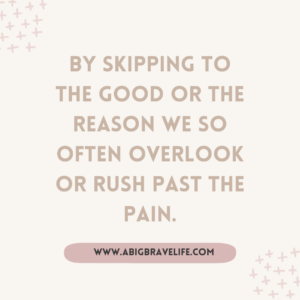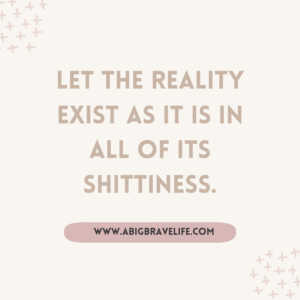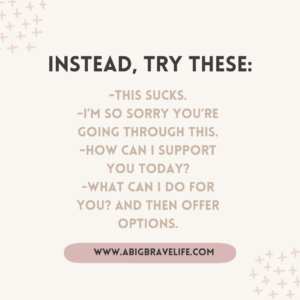When someone receives really difficult news, a life altering diagnosis, or suffers a loss there are a lot of things we tend to say that we just simply shouldn’t. After sitting on this post for literal years, I am sharing some of the words and phrases that were most difficult for me to receive after Molly’s cancer diagnosis. Here’s what NOT to say to someone grieving a diagnosis…
I want to preface this by saying this. We have likely all been guilty of saying at least one or more of these things at some point in time. That does not make you a bad person. It does not make you insensitive. Even as we heard them we almost always knew the person was coming from a good place. And yet, they’re still not helpful. Both of those things can be true at the same time, so just know that as you read.
1. This will make her (or you) so much stronger.
While that might be true, it is not helpful. If given the choice between my child being a little less “strong” and not having cancer vs being “strong” and having cancer I would absolutely opt out. And yes, good things can come out of horrifying, scary situations. But I don’t need my 2 year old (at the time) to be strong. I need her to be a child.
Similarly, even saying this to adults doesn’t sit well. I was pretty darn strong before. And I feel anything but strong as I sacrifice all control to the doctors and teams and struggle to juggle the reality of it all. Let’s just take the pressure to be or appear “strong” off the table in times of crisis.
2. She was/You were chosen to carry this.
This one makes my blood boil a little bit, and I heard it often. Regardless of your beliefs about god, the universe, etc. the thought of a child (or anyone) being hand selected to have cancer is not reassuring. It feels cruel. It can instead make it feel like you are being punished or you did something to deserve this outcome. Again, not helpful. You cannot expect someone grieving something so huge to wear it as a badge of honor when it feels like living your worst nightmare on repeat.
3. Luckily she’s so young she won’t remember this.
Yes, it is a blessing, if that’s what you want to call it, that Molly was young enough that she may not remember the specifics of hospital stays, all the pokes, etc. But I have no doubt all that trauma still lives in her body. She does and will remember it on some level. And while she might not remember it, it also meant she didn’t understand a lot of it either. This is now a part of her story forever and yet she has very little recollection of it. That feels complicated.
And, even if she doesn’t remember it, the people who love her absolutely will for the rest of our lives.
4. Everything happens for a reason.
Does it though? Ask any parent whose child is suffering from illness and I can promise you they struggle with this one. Why my child? Why this illness? Why now? Why, why, why?! And it’s not that we wish it were someone else, but the reality feels so cruel and grueling that it can be really difficult to add the pressure of discovering the meaning or reason. To expect anyone to find purpose, especially when it is new and fresh is unfair.
That isn’t to say good things can’t grow out of it. They absolutely can and likely will. But by skipping to the good or the reason we so often overlook or rush past the pain.

5. God doesn’t give you more than you can handle.
I wrote an entire post about this. God, or whoever you believe in, gives us more than we can handle every single freaking day. No parent or individual is cut out to handle cancer. We aren’t.
6. You’re handling this so well. Or You’re handling this so much better than I would.
Just don’t. You have no idea how that person is handling or coping. You can’t know.
I heard this one A LOT. I know it was meant as a compliment. But what people didn’t know was that I felt miserable, exhausted, riddled with fear…I wasn’t sleeping. I was losing weight because I had no appetite. But I looked put together. It felt like validating the worst parts of my experience and also reinforcing that I had to keep it up. It creates this weird alternate reality where you feel like your pain and struggle can’t exist or show up. The goal is to mask those with some mascara and a cute outfit. That’s not sustainable or healthy.
In the midst of people telling me how well I was handling things I had to buy a special toothbrush motor that connected by bluetooth to an app just so I knew whether or not I had brushed my teeth that day. Between home and the hospital and remembering all my questions and making sure I didn’t miss rounds and making sure Jack was cared for at home and all of the things my self care bottomed out. I couldn’t even remember if I brushed my freaking teeth. You have no idea how well someone is handling anything. And even if it appears they’re doing “well” they may feel the opposite.
7. Trying to reassure that it’s not that bad or that it could be worse.
I know what people are trying to do when they use ones like this. “Yes, she has leukemia but the cure rate is over 90%!” Ok. Statistics in that regard mean very little at this point. The chance of my child getting cancer was already slim but that happened. Security is gone. Don’t try to console me with numbers when the odds have already proven to not be in our favor.
And yes, it could almost always be worse. Until it can’t. And every parent in my situation tries not to let their brain go down the road of worst case scenario, but it is really darn easy to do that from time to time. And the journey down that road feels short. Let’s do our best to not lead parents in an already fragile state of mind to that crossroads. Let the reality exist as it is in all of its shittiness.

8. I cannot imagine what you’re going through.**
I almost didn’t include this one. I know I’ve said it, even recently. And usually when I say it or when it was said it was meant as, “I cannot even begin to understand exactly what you’re going through.” And sometimes that can be helpful. This one really boils down to tone which is why the **
I know there were times this was said to me and all I wanted to scream was “thank god you don’t have to!” It can feel very othering. Like this experience is so huge and scary and bad that you can’t even imagine it. And of course you can’t. Nobody truly can until they’re in it.
This can also come across, depending on the tone as, “thank goodness it’s not me or my child.” So maybe just avoid it or simply add an “I cannot imagine everything you’re carrying, and I’m not going to pretend to understand. Tell me how you’re doing and what you need.”
What to Say Instead
Ok, so that was a lot of don’ts. (And also a lot of pent up rage at some of the things I’ve been told.) Next time you catch yourself wanting to say one of those things, try these instead:

-This sucks. Period. This can go a long way to making someone feel less alone.
-I’m so sorry you’re going through this.
-How can I support you today? Then actually do the thing they say they need.
-What can I do for you? And then offer options: bring a meal or gift card, meet you and go for a walk, take your child or supply an activity… My favorite is when someone said “I am doing at least one of these three things. You can choose the one that’s most helpful or I can do all three.”
And the last thing I would say you should do/say is check in after time has passed, even when things are going well. I know when Molly was hospitalized there was a huge outpouring that first month. But six months into treatment, we were still very much feeling like we were in the weeds of it, but the check ins had pretty much stopped. It can feel VERY isolating. When you think of a child or family going through something like this, text them. It can be as simple as “I’m thinking about you guys.” or “Just wondering how Molly is doing? And how are you?” Those little things that remind us we still have people in our corner are huge for keeping our spirits up. Just don’t bring them right back down by telling us how well we are handling 😉
With so much love and gratitude,
Am
